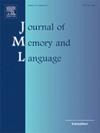工作记忆中的认知负荷效应:刷新经验图景,消除过时解释
IF 3
1区 心理学
Q1 LINGUISTICS
引用次数: 0
摘要
在工作记忆中保持信息往往会与同时处理其他信息发生竞争。认知负荷效应就反映了这一点。认知负荷效应指的是认知负荷较高的处理任务会导致较低的记忆成绩。认知负荷效应曾多次在复杂的跨度任务中显示出来,这些任务将记忆项的保持与记忆项呈现之间交错的处理需求结合在一起。工作记忆的两个模型,即基于时间的资源共享(TBRS)模型和盒中序列顺序--复杂跨度(SOB-CS)模型,为认知负荷效应提供了相互竞争的解释。这两个模型都预测,在布朗-彼得森任务中也会出现认知负荷效应,因为在该任务中,处理需求是在所有记忆项目呈现之后插入的。通过三个实验,我们发现:(1)认知负荷效应在复杂跨度任务中始终大于布朗-彼得森任务;(2)认知负荷效应在布朗-彼得森任务中大多不存在,只有一个例外。当前版本的 TBRS 模型和 SOB-CS 模型无法解释这些发现。我们将讨论这些模型需要哪些新的假设来解释我们的发现,并考虑用其他方法来解释当前的观察结果,即纯粹用自由时间而不是认知负荷来解释。本文章由计算机程序翻译,如有差异,请以英文原文为准。
The cognitive load effect in working memory: Refreshing the empirical landscape, removing outdated explanations
Maintaining information in working memory often competes with concurrent processing of other information. This is reflected in the cognitive load effect, referring to the observation that processing tasks with a higher cognitive load result in lower memory performance. The cognitive load effect has been shown on many occasions in complex span tasks, which combine maintenance of memory items with a processing demand interleaved in between the presentation of the memory items. Two models of working memory, the Time-Based Resource-Sharing (TBRS) model, and the Serial Order in a Box – Complex Span (SOB-CS) model, offer competing explanations for the cognitive load effect. Both lead to the prediction that a cognitive load effect should also be found in the Brown-Peterson task, in which the processing demand is inserted after the presentation of all of the memory items. Across three experiments, we show that (1) the cognitive load effect is consistently larger in the complex span task than in the Brown-Peterson task, and (2) the cognitive load effect is mostly absent in the Brown-Peterson task, with one exception. The current versions of the TBRS and SOB-CS models cannot account for these findings. We discuss what new assumptions are necessary for these models to explain our findings and consider alternative accounts explaining the current observations purely in terms of free time instead of cognitive load.
求助全文
通过发布文献求助,成功后即可免费获取论文全文。
去求助
来源期刊
CiteScore
8.70
自引率
14.00%
发文量
49
审稿时长
12.7 weeks
期刊介绍:
Articles in the Journal of Memory and Language contribute to the formulation of scientific issues and theories in the areas of memory, language comprehension and production, and cognitive processes. Special emphasis is given to research articles that provide new theoretical insights based on a carefully laid empirical foundation. The journal generally favors articles that provide multiple experiments. In addition, significant theoretical papers without new experimental findings may be published.
The Journal of Memory and Language is a valuable tool for cognitive scientists, including psychologists, linguists, and others interested in memory and learning, language, reading, and speech.
Research Areas include:
• Topics that illuminate aspects of memory or language processing
• Linguistics
• Neuropsychology.

 求助内容:
求助内容: 应助结果提醒方式:
应助结果提醒方式:


